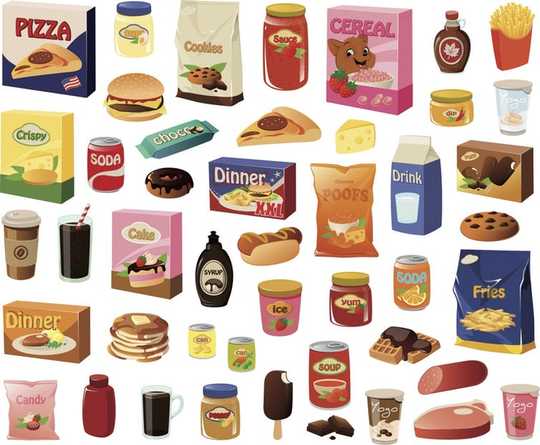 Altagracia Art/Shutterstock.com
Altagracia Art/Shutterstock.com
Eating ultra-processed food is definitely bad for you, a recent study has confirmed. In the experiment, people were fed either ultra-processed or unprocessed food, with meals matched precisely for calories, salt, sugar, fat and fibre. Those on ultra-processed food ate more and gained more weight within two weeks.
This finding puts two torpedoes in the notion that “all calories are the same”. Recent studies have linked ultra-processed foods to obesity, cancer, heart disease and early death.
Most foods need some level of processing, such as freezing or pasteurisation in order to prolong shelf life, food safety and commercial viability, but “ultra-processed” products have little or no intact “food” remaining. Rather, they are made principally from already processed commodities, such as potent sugars, modified oils and salts and they undergo an array of further processes such as emulsification, thickening and carbonating. No longer really foods, they are better thought of as formulations.
One strategy to make ultra-processed products less harmful is to reduce the amount of salt, sugar and unhealthy fats in them through what is known as “reformulation”: redesigning an existing processed food product with the objective of making it healthier. Reformulation could help if it had adequate scope and intensity – and it may act to bolster other sugar, salt and fat reduction strategies such as taxes or improved product labelling. But while about a dozen countries have mandatory salt and trans-fat limits, none have set legal limits for sugar and saturated fats in foods.
Get The Latest By Email
Food reformulation has been around since the early 1980s, and it has always been a business opportunity for large food brands to compete for health conscious consumers. Only recently – since the mid-2000s – has it become a high-level strategy for food companies seeking to proactively adopt it to avoid mandatory nutrient limits. Countries all over the world now collaborate with the food industry to reformulate ultra-processed foods – a partnership that has received widespread and enthusiastic endorsement from senior policy makers. A recent food industry report to the Irish government on putative improvements in diet resulting from industry reformulation is a case in point.
But we have found what we feel are selection biases, ecological fallacies and inappropriate study design that we argue make the inferences about the benefits of industry-led reformulation in this report unsound. Others have described how methodological weaknesses limit the policy “relevance” of similar industry reports. In seeking to lead and influence national dietary strategies, the food industry promotes two consistent narratives: that reformulation is enormously difficult and expensive, and that it must happen slowly because consumers will react negatively to dramatic changes in taste.
So what exactly is wrong with industry-led reformulation? We think it has four serious dangers.
#Reformulation in the food and drink industry has been taking place for many years #SugarReduction https://t.co/ZRoJYbiqC7 pic.twitter.com/kXU6dDn01v — FDF (@Foodanddrinkfed) March 30, 2017
1. A PR strategy
Because reformulation has been framed by industry as a series of voluntary commitments, big food actors across the world look like they are doing government and society at large a massive favour, all the while burnishing their corporate images. Indeed, the websites of ultra-processed food companies prominently feature reformulation. Consider, for instance, Mondelez’s “commitment to improve the nutritional content of our most loved brands”. We argue that this discourages faster progress towards the promotion of significantly healthier diets.
2. Industry saviours
Industry-led reformulation stages the food industry as the saviour from our obesity problem. It places them as a central authority which can speak reliably and legitimately about nutrition goals with governments. Food brands speak convincingly about how much sugar, salt or fat they extract from national diets.
The Irish reformulation report for example, states that between 2005 and 2017, beverage companies removed 10 billion calories from the annual diets of the country’s 4.8m people. But it is silent about how many calories the companies are responsible for introducing to the diet in the first place.
This mirrors industry development of low tar cigarettes, which were an ineffective, tokenistic industry-led solution to the public health crisis that smoking presented. In the same way, voluntary reformulation of unhealthy food products that are making so many of us sick risks delaying more substantive strategies to get rid of the most harmful products altogether.
 The sugar baseline. Alexander Weickart/Shutterstock.com
The sugar baseline. Alexander Weickart/Shutterstock.com
3. A false picture
The ultra-processed food industry reformulates existing products while adding more to the food system. It is constantly creating new products such as cereal bars or “snackfections”); new formats which masquerade as portion control but actually increase snacking (bites, thins, share size); new eating occasions (Domino’s World Pizza Day, Cadbury’s Friendship Day); new category expansions (biscuits for breakfast, meat snacks) and new retail concepts.
A recent study by the Food Safety Authority of Ireland found that while there were indeed some decreases in the amount of salt and sugar in the category of “baby foods” in the country, there were whole new classes of foods created for babies that it deemed “inappropriate”: products that normalise snacking in babies and young infants. We need to measure not just reformulation at a product level, but how many new ultra-processed foods are being produced, to get a true picture of the changing food system.
4. Status quo bias
Status quo bias happens when a baseline is mistaken for a standard to strive towards. The Irish reformulation strategy is a good example: if Irish children are eating 101g of added sugar per day, it will take about 300 years to reach the recommended intake of 25g at current rates of decline. Such bias contributes to policy inertia, where it is imagined that the food system can be tinkered around with, rather than needing to be fundamentally revolutionised.
Industry-led reformulation has become a public relations strategy – a goodwill gesture that enhances the dominance and legitimacy of the ultra-processed food category. The ultra-processed concept is not challenged. It is inadvertently legitimated as attention is focused on changing the formulas of energy-dense, nutrient-poor foods instead of working out ways to replace them altogether.
Some of the ways that governments might intervene include subsidies for fruits and vegetables, tax breaks for local food co-operatives and food growers, school and adult education. Ultimately, cultural norms need to change so that people have more time to think about what they eat – and to cook it.![]()
About The Author
Norah Campbell, Associate Professor in Marketing, Trinity College Dublin and Francis Finucane, Personal Professor of Medicine, National University of Ireland Galway
This article is republished from The Conversation under a Creative Commons license. Read the original article.
books_food







